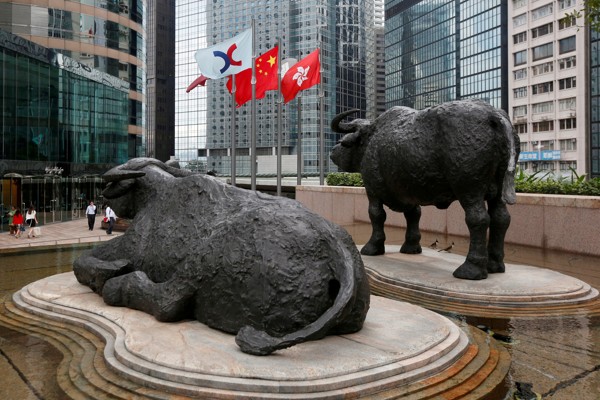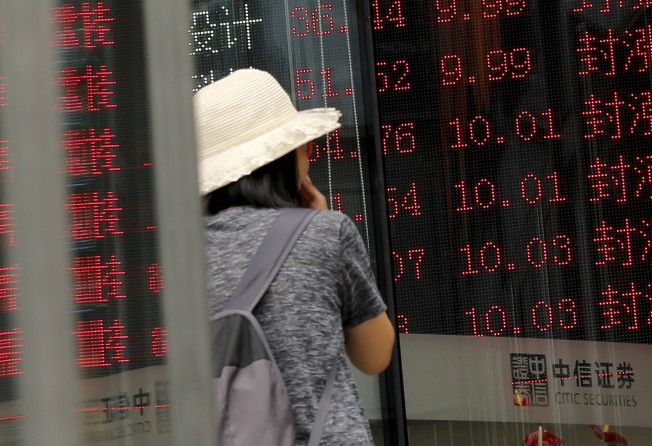
Hong Kong stocks gain for a third straight session, lifting Tencent’s valuation above US$500b milestone
Hang Seng Index ends 0.2pc higher at 29,260.31; Tencent’s share turnover accounted for 13.4 per cent of the total turnover on the Hong Kong stock exchange

Hong Kong stocks closed higher on Monday, aided by a surge in Tencent Holdings, whose market value surpassed US$500 billion.
More than HK$14.5 billion (US$1.86 billion) worth of Tencent shares changed hands, accounting for 13.4 per cent of the total turnover on Hong Kong’s main board, which stood at HK$108.2 billion.
The Hang Seng Index shook off a shaky morning session to eventually close 0.2 per cent higher at 29,260.31, extending its winning streak to a third straight session.
The Hang Seng China Enterprises Index, known as the H-shares index, lost 0.6 per cent to 11,538.28.
Tencent was the biggest contributor of gains, lifting the Hang Seng Index by 144 points.
The Chinese internet giant gained 4.1 per cent to HK$420, lifting its market capitalisation to HK$3.99 trillion.
Among Macau casinos, Galaxy Entertainment advanced 4.1 per cent to HK$58 and Sands China rose 2.9 per cent to HK$37.3.
Banking stocks were under pressure as China Construction Bank fell 1.2 per cent to HK$6.73 while rival ICBC eased 1.1 per cent to HK$6.12.
Sun Art Retail Group retreated 4.1 per cent to HK$8.25 as the stock resumed trading after being suspended last week. E-commerce giant Alibaba Group Holding said Monday it would buy a combined 36.2 per cent stake in the hypermarket operator for HK$22.4 billion.
On the mainland, the Shanghai Composite Index finished 0.3 per cent higher at 3,392.4, halting a four-day losing streak.
The CSI300 Index gained 0.6 per cent to 4,143.83, the Shenzhen Composite Index was up 0.9 per cent to 1,971.93 and the start-up board ChiNext index climbed 1.4 per cent to 1,859.75.
Turnover for the Shanghai and Shenzhen markets amounted to 489.4 billion yuan, reflecting a decline of more than 20 per cent from Friday’s session.

The People’s Bank of China, along with securities, banking and insurance regulators, rolled out sweeping rules for the nation’s US$15 trillion asset management industry after the market close on Friday, banning guaranteed returns and requiring funds to serve the real economy rather than arbitrage through investing in tiers of financial products. The move comes a month after the National Party Congress, in which President Xi Jinping stressed on preventing systemic financial risks.
“The new rules show that the deleveraging is far from over,” said Wu Kan, a fund manager at Shanshan Finance in Shanghai. “It’s sending out a signal that the financial scrutiny will be getting more and more strict going forward and liquidity will remain tight.”
The draft rules, which were released for public consultation and will not be implemented until the middle of 2019, will be applied to banks’ wealth management products, trust products, mutual funds and private funds.
The rules also aim to tackle “excessive leveraging” in the non-bank financial sector, with leverage limits to be set on asset management products. The total assets to net assets ratio will be capped at 140 per cent for mutual funds and 200 per cent for private funds.
DHC Software tumbled 3.3 per cent to 9.3 yuan and Hithink RoyalFlush Information Network lost 2.8 per cent to 52.02 yuan.
Financial companies also declined. Anxin Trust plunged 6.2 per cent to 13.99 yuan and Caitong Securities sank 3.9 per cent to 19.78 yuan.
Liquor major Kweichow Moutai shed 1.6 per cent to 679.27 yuan, extending a 4 per cent slump on Friday after the state news agency Xinhua targeted the company for its excessive share-price gains.